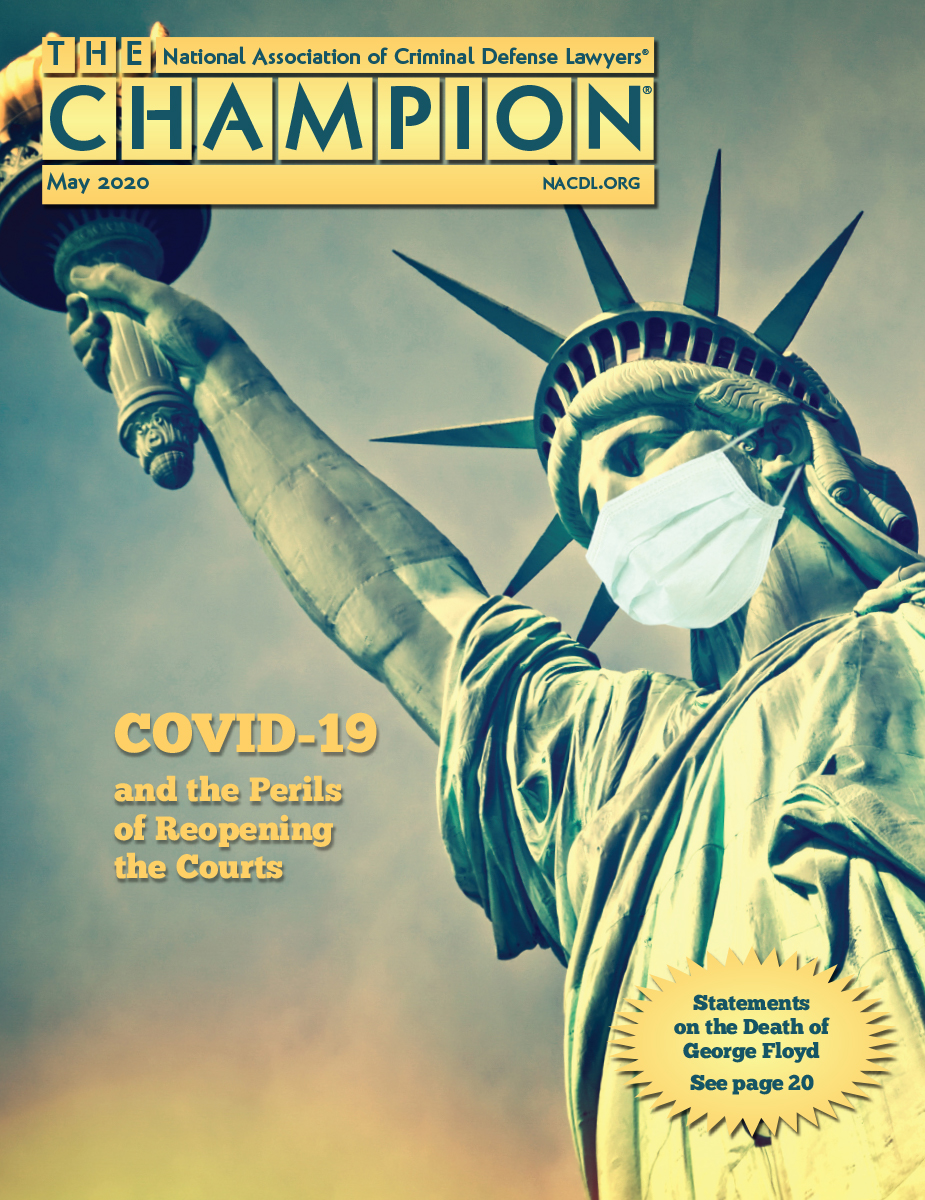May 2020

Faced with trials and hearings conducted via videoconference platforms, how can stakeholders ensure that the constitutional tenets upon which our system of justice is built survive the coronavirus pandemic?
Articles in this Issue
-
Affiliate News
What events are NACDL affiliates hosting this month? Find out here.
-
Ain’t Nothing Like the Real Thing: Will Coronavirus Infect the Confrontation Clause?
The fact that hearings and trials can be conducted via videoconference platforms does not make these proceedings legal. Criminal trials in which some or all witnesses testify remotely are susceptible to Sixth Amendment challenges. The authors offer five factors concerning which defense counsel should ask a judge to make findings before any witness testifies via two-way videoconference.
-
Book Review: Deported to Death by Jeremy Slack
This month Linda Friedman Ramirez reviews Deported to Death: How Drug Violence Is Changing Migration on the US-Mexico Border by Jeremy Slack.
-
Book Review: Quest for Justice by Richard Jaffe
This month Elizabeth Kelley reviews Quest for Justice: Defending the Damned – 2nd ed. by Richard S. Jaffe.
-
Book Review: Solitary by Albert Woodfox and Leslie George
This month Allan F. Brooke II reviews Solitary: Unbroken by Four Decades in Solitary Confinement by Albert Woodfox with Leslie George.
-
COVID-19’s Next Victim? The Rights of the Accused
What is the best way to resume in-person proceedings as courts reopen after closures stemming from the COVID-19 pandemic? Defendants have a right to be physically present in the courtroom. How can courts ensure a fair and constitutional process going forward?
-
Criminal Court Reopening and Public Health in the COVID-19 Era: NACDL Statement of Principles
Business as usual will be impossible as courts restart face-to-face jury trials during the coronavirus pandemic. NACDL has identified 10 fundamental principles that can minimize the constitutional burden while protecting the public and stakeholders who must come together in the courtroom.
-
Cross Country: You should have been told.
The “you should have been told” technique offers experts a way to concede their errors while protecting their self-image by blaming others.
-
From the President: The Perils of Virtual Trials
Courts are developing protocols for how to safely resume jury trials after the coronavirus pandemic. The defense community cannot allow expedient solutions to backlogged dockets to subvert the Constitution by sanctioning proceedings that fall short of constitutional and statutory protections.
-
Inside NACDL: Albert J. Krieger: In Memory and Tribute
No lawyer did more in the past half century to define the defense function than Albert Krieger.
-
NACDL News: COVID-19 and California’s Carceral System: Recent NACDL Litigation
NACDL News for May 2020.
-
NACDL News: NACDL, FAMM, Washington Lawyers’ Committee Launch Emergency Compassionate Release Effort
NACDL News for May 2020.
-
Statements on the Death of George Floyd
The killing of George Floyd and the protests against police brutality that followed have resulted in a burgeoning reform movement. Several organizations issued statements reflecting on his death and voicing hope that one day systemic and overt racism will end.
-
We, the Jury: Racial Profiling in the Jury Box: New Jersey v. Andujar
During voir dire in New Jersey v. Andujar, a prosecutor ran a criminal background check on one prospective African American juror in order to have that juror challenged for cause. The appellate court determined that the trial judge, before dismissing the juror for cause, should have made a finding of fact regarding the validity of the criminal background check.
